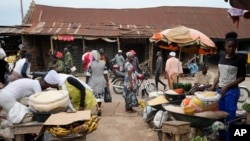The country's National Bureau of Statistics, NBS, said in its inflation report for June "On a year-on-year basis, the Headline inflation rate was 4.19% points higher compared to the rate recorded in June 2022, which was 18.60%.
According to the NBS report, food inflation was 25.25% in June 2023 from 24.82% in May 2023, which accounts for the bulk of Nigeria's inflation basket.
Experts say that this will compel the country's central bank to employ a contractionary policy when it meets next week to set interest rates, in a bid to curb rising inflation.
Next week's meeting will be the first since new president Bola Tinubu suspended central bank governor Godwin Emefiele in June after promising a "thorough house cleaning" of monetary policy at his May inauguration.
At its last monetary policy meeting in May, the central bank under Emefiele hiked its main interest rate by 50 basis points to 18.50%.
Under Tinubu, Nigeria has embarked on its boldest reform agenda in decades, including the removal of petrol subsidies and the loosening of restrictions on foreign exchange trading, a gamble by Tinubu to try to boost sluggish economic growth.
Inflation has been in double digits in Africa's biggest economy since 2016, eroding savings and incomes.
Analysts had warned that a weaker naira currency and the fuel subsidy removal were likely to push inflation higher in the short term.
Some information in this report came from Reuters

Forum